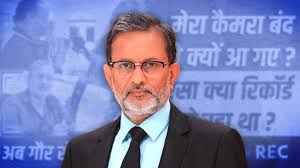Journalist Ajit Anjum booked for ‘interfering’ in Bihar electoral roll revision, police say

Veteran journalist and YouTuber Ajit Anjum faces serious legal trouble in Bihar. Police booked him for allegedly interfering with the voter list revision process in Begusarai district. The FIR was filed at the Ballia police station on July 13, 2025. It followed a complaint by booth-level officer (BLO) Mohammad Ansarul Haque.
🗂️ What Happened?
On July 12, Anjum visited a polling booth in Ballia while the BLO was uploading new voter entries into the Election Commission portal. He arrived with his crew and reportedly started filming without permission. The BLO claimed Anjum questioned him about the number of Muslim voters. He said the journalist delayed his work for over an hour.
Haque also said Anjum accused the administration of harassing Muslim voters. According to the complaint, Anjum disrupted the process and recorded a video that could “incite communal tensions.”
Police booked Anjum under several charges:
- Criminal trespass
- Obstructing a public servant
- Disobeying lawful orders
- Offending religious sentiments
They also cited sections of the Representation of the People Act, 1951, and Bharatiya Nyaya Sanhita, 2023.
🎥 Anjum Defends His Reporting
Ajit Anjum denied all allegations. In a video and social media post, he said he had only highlighted genuine issues. According to him, some voter forms lacked photos and signatures. He said he never tried to provoke anyone or stop officials from working.
“My report was fair, factual, and necessary,” he stated. “If pointing out flaws in the voter roll is a crime, then democracy is in danger.”
Anjum also accused officials of using the BLO as a scapegoat. He called the FIR a move to silence critical voices. He said he is ready to defend himself in court and, if needed, will approach the Supreme Court.
🗳️ Background: Bihar’s Voter List Revision
The Election Commission is currently conducting a Special Intensive Revision (SIR) of electoral rolls across Bihar. The aim is to add new voters and correct existing errors before the upcoming assembly elections.
The draft voter list will be published on August 1. People can submit objections or request corrections until August 31.
However, the process has drawn criticism. Activists and opposition parties fear that many poor and marginalized people could be excluded. They argue that strict documentation rules might prevent people from registering as voters.
Ajit Anjum’s viral video focused on such issues. He showed BLOs working without proper supervision and documents missing key details. He claimed some officials were rushing through the process without verifying applicant identities.
🧾 Mixed Reactions from the Public
The FIR has sparked debate. Many journalists, civil rights activists, and citizens have voiced support for Anjum. They say the FIR is an attack on press freedom and an effort to hide flaws in the system.
Prominent journalist Ravish Kumar wrote on X (formerly Twitter), “Instead of correcting the errors, the system is targeting the messenger. This is a threat to both journalism and democracy.”
Others have argued that rules apply to everyone. They believe that even journalists must follow protocol and avoid disrupting official work.
Some voters from the area told local media they appreciated Anjum’s efforts. They said no one else had raised concerns about how the voter revision was being handled.
⚖️ Legal Perspective
Lawyers and experts have offered varied opinions. Some say Anjum did not break any serious law. Others believe he should have followed official procedures before filming inside a polling booth.
Supreme Court advocate Meenakshi Sharma said, “Even if there were lapses in procedure, booking someone under such serious sections sets a bad precedent. This case should be handled carefully to protect both law and free speech.”
🔍 What Comes Next?
The case has become a major talking point in Bihar. It highlights a growing tension between public interest journalism and bureaucratic control. Anjum says he will continue reporting on voter issues. He believes his work holds officials accountable.
The local election office has not commented on the FIR. However, sources said they will review the incident to check if BLO protocols were followed.
As the legal process moves ahead, the case may shape how journalists interact with election officials in the future. It also adds pressure on authorities to ensure transparency during the voter list revision.






